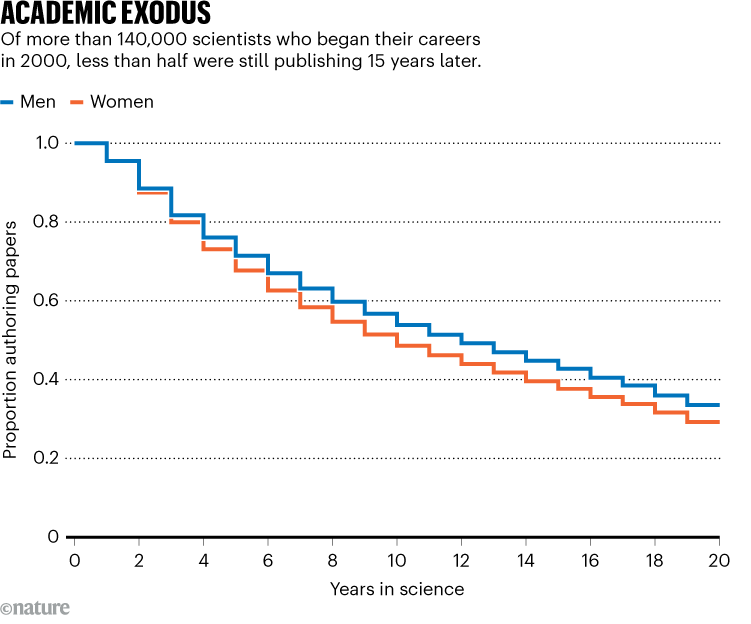
Publishing data can help to reveal how many scientists choose to leave research and pursue another career.Credit: Christian Guiton/Getty
A study of nearly 400,000 scientists across 38 countries finds that one-third of them quit science within five years of authoring their first paper, and almost half leave within a decade.
The analysis, published in Higher Education1, used data from the citation database Scopus to track scientists’ scholarly publishing careers — a proxy for how active they are in research. It found that, overall, women were more likely than men to stop publishing, but the size of this difference varied between disciplines.
Has the ‘great resignation’ hit academia?
“We have always been thinking and knowing that people leave science, but the scale of leaving science was somehow unknown,” says study co-author Marek Kwiek, an academic-career researcher at the Adam Mickiewicz University in Poznań, Poland.
The study is the largest attempt to quantify the number of people leaving science — previous studies have been limited in scope, and focused mainly on scientists in the United States.
“When you have this kind of big data, it becomes more compelling to recognize that this is a problem,” says Joya Misra, a sociologist at University of Massachusetts, Amherst, who studies gender and inequality in academia.
Leaving the lab
Kwiek and his colleagues tracked the publishing careers of two groups — 142,776 scientists (52,115 of whom were women) who began publishing in 2000, and 232,843 scientists (including 97,145 women) who began publishing in 2010.
The scientists were based in countries including the United States, Japan, South Korea and nations across Europe, and they represented 16 scientific disciplines.

Source: Ref. 1
The study found that, within five years, one-third of all scientists in the 2000 group had stopped publishing. This rose to about half within ten years and to nearly two-thirds by 2019 (see ‘Academic exodus’). Women were around 12% more likely than men to have left science after five or ten years. By 2019, only 29% of women in the group were still publishing, compared with nearly 34% of men.
The 2010 group showed a narrower gender gap: about 41% of women and 42% of men were still publishing nine years after their first paper. This improvement is promising, says Damani White-Lewis, a higher-education and academic-career researcher at the University of Pennsylvania in Philadelphia. “It’s always good to know when we’re making progress, because we need to be able to replicate those things.”
Toxic workplaces are the main reason women leave academic jobs
But in some scientific disciplines — particularly life sciences — there were stark differences between men and women. For example, for women in biology, the likelihood of leaving science after ten years was 58%; for men, it was nearly 49%.
By contrast, for women in physics, the likelihood of leaving after ten years (around 48%) was roughly the same as that for men (47%). There were also few gender differences for mathematics, engineering and computer science — all fields in which women tend to be under-represented.
The findings “bring necessary, vital attention to the ways in which we’re facilitating entry, success and retention” in research, says White-Lewis.
Reasons to quit
Misra notes that, in reality, gender gaps could be larger than the publication data suggest. “A lot of times, women aren’t recognized as collaborators on published work, and so we tend to be under-represented in the publications that appear. There’s also kind of a bias there. We don’t really know who should have been listed as authors on papers,” she says.
And although the study offers some insights about where and when scientists are leaving the profession, it does not explain why.
Nearly half of US female scientists leave full-time science after first child
There are several factors, aside from leaving research entirely, that could explain why scientists stop publishing, such as moving to a less research-focused institution, taking a job in industry or switching to an administrative role. “We don’t 100% know exactly what’s happened to people,” says Misra. “We can’t know it without interviews and without surveys,” adds Kwiek.
In a 2023 study, White-Lewis and his colleagues analysed the departure decisions of 773 faculty members in US academic institutions between 2015 and 2019, and found that family reasons, tenure status and salary were significant drivers behind decisions to leave2.
In future studies, Kwiek plans to conduct large-scale surveys and use artificial-intelligence chatbots to conduct interviews to investigate the why researchers exit the profession.
“It would be interesting to layer Scopus data onto institutional data”, such as exit surveys, to better understand why scientists step away from academic careers, says White-Lewis.





